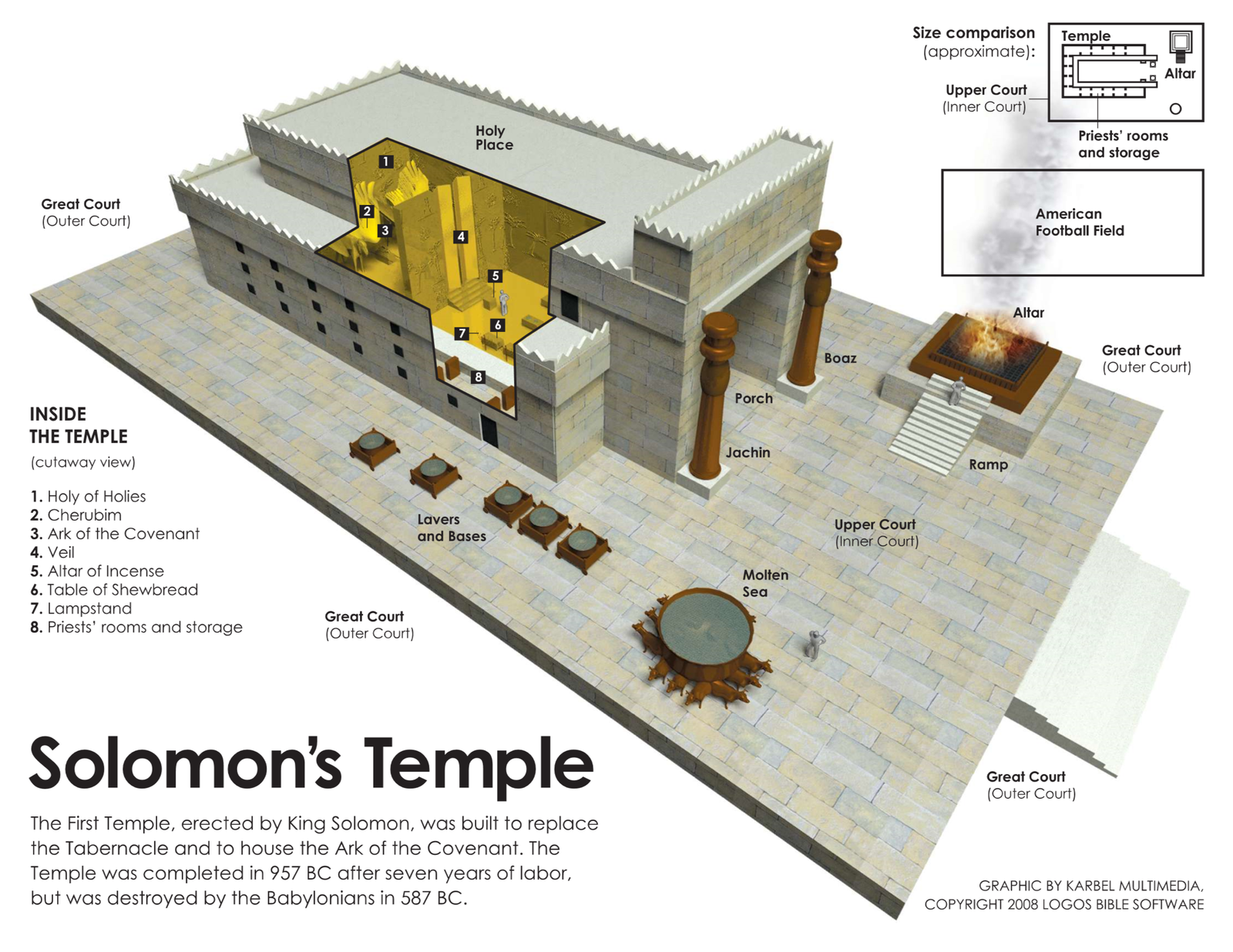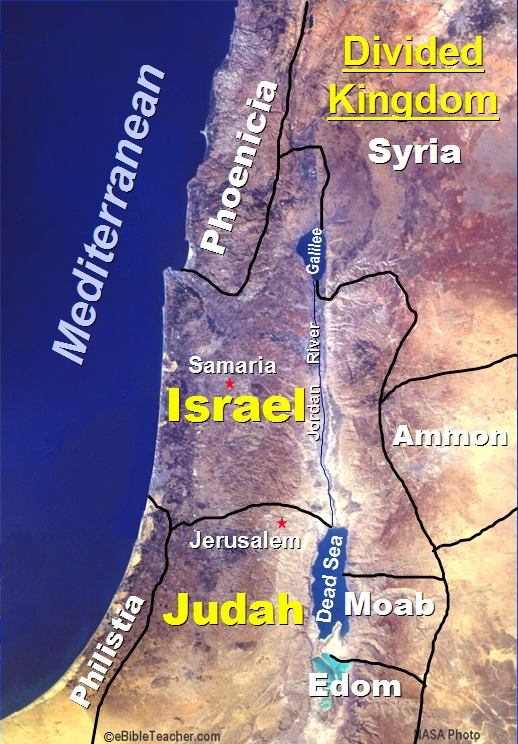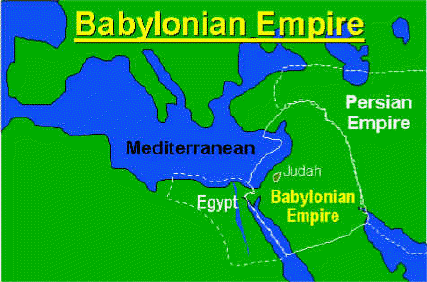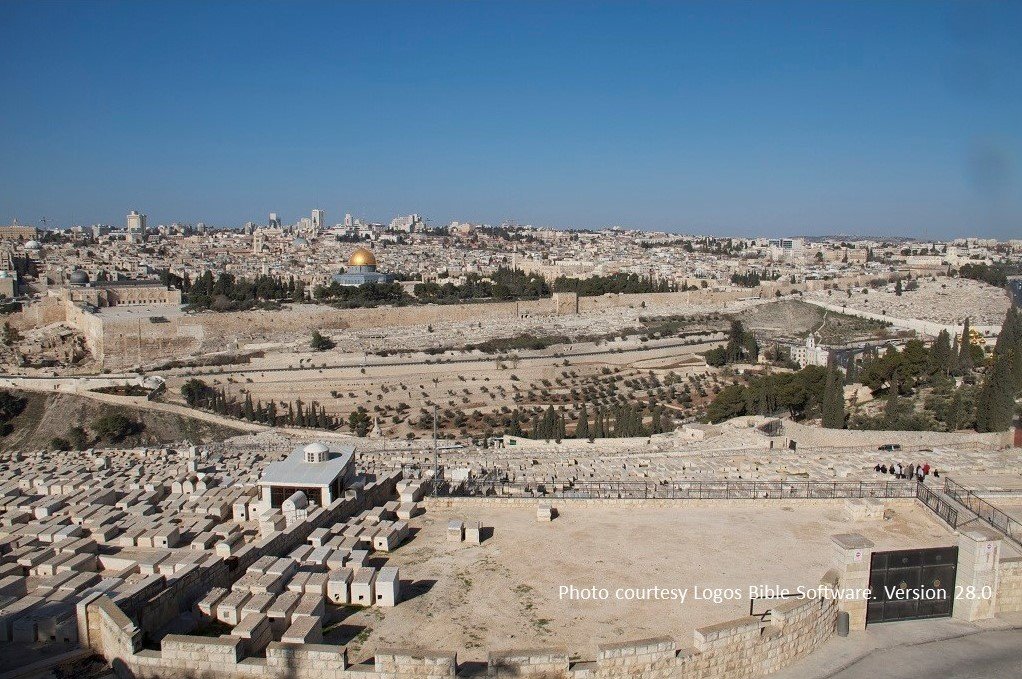In our second study we continue our bird’s eye view of the history of the Jewish nation – this time focusing on the nation of Israel from the time of the monarchy through the Babylonian exile. As before, keep your eye out for the sovereign hand of God as we survey the history of his chosen people – the Jews.
The United Kingdom: 1050 – 930 B.C.
This period of Israel’s history is recorded in the latter part of I Samuel, II Samuel, the first part of I Kings, I Chronicles, and the first part of II Chronicles. The book of I Samuel marks the transition from the time of the Judges to the establishment of the Jewish monarchy under King Saul in approximately 1050 B.C. II Samuel continues the narrative and primarily covers of the reign of Israel’s second king, David. The books of I & II Kings and I & II Chronicles both survey the history of the Jewish monarchy from King David’s reign through the exiles of the northern kingdom (by the Assyrians) and the southern kingdom (by the Babylonians). Why two separate accounts of the Jewish monarchy? It has to do with the timing and purpose for which each account was written. I & II Kings was written during the period of the exile to explain to the nation that the reason she was exiled from her homeland was because of her disobedience to God. I & II Chronicles was written later (after the return of Israel to her homeland) and was designed to help the newly restored nation understand her link to the past and her hope for the future.
At the close of our previous lesson we left the nation of Israel at the end of the time of the judges. As discussed previously, it was during this time that the nation of Israel experienced repeated cycles of disobedience, suffering, and repentance followed by restoration under a God-appointed leader (or judge). The last of these judges was the prophet Samuel. In I Samuel 8 we read that the people of Israel tired of God’s appointed leadership and longed for a king to rule over them as the pagan nations around them had:
Then all the elders of Israel gathered together and came to Samuel at Ramah; and they said to him, “Behold, you have grown old, and your sons do not walk in your ways. Now appoint a king for us to judge us like all the nations.” But the thing was displeasing in the sight of Samuel when they said, “Give us a king to judge us.” And Samuel prayed to the LORD. The LORD said to Samuel, “Listen to the voice of the people in regard to all that they say to you, for they have not rejected you, but they have rejected Me from being king over them. “Like all the deeds which they have done since the day that I brought them up from Egypt even to this day — in that they have forsaken Me and served other gods — so they are doing to you also. “Now then, listen to their voice; however, you shall solemnly warn them and tell them of the procedure of the king who will reign over them.” (I Samuel 8: 4-9 NASB, emphasis added)
God knew that Israel’s desire for an earthly king was not in her best interests; however, like a stubborn child the people were determined to go their own way, so God granted the desire of the people and directed Samuel to appoint Saul as king over Israel. By all appearances Saul was the perfect choice as king. But, as is so often the case, Saul’s outward appearance proved in time to not be an accurate representation of his inner character. After a good start, Saul began a slow but steady descent from a man who followed after God to a man completely absorbed with himself. In the end, Saul’s lack of dependence upon God cost him not only his throne but his life. To this day the life of Saul serves as a tragic example of great potential gone unfulfilled.

Although Saul was the first king of Israel, his fame is far eclipsed by Israel’s second monarch – David. Unlike Saul, David at first seemed an odd choice for king. Unimpressive and least among his family by the standards of the day, God saw in young David “a man after His own heart” (I Samuel 13:14) and directed the prophet Samuel to anoint David as king in place of Saul. Though he was anointed king in about 1025 B.C., it wasn’t until Saul’s death in 1010 that David actually assumed the role of king – first over only the tribe of Judah in 1010 and then over the entire nation of Israel in 1003 B.C. David’s reign was a time of conquest and growth for the nation of Israel. Because of David’s heart for God, the nation of Israel prospered. Under his military leadership the Jews defeated many of the surrounding nations and extended the nation’s borders in fulfillment of God’s promise to Abraham a millennium before (see Genesis 15:18). It was David who established Jerusalem as the capital of Israel, and it was under David’s able military leadership that Israel finally completed the conquest begun by Joshua and completed her borders. While David was not immune to the life-tainting effects of sin (the episode with Bathsheba being the most infamous), he never lost his heart for his God. It is for this reason, despite his failures, that David is still revered as Israel’s greatest king.
Following David’s death in 970 B.C. his son Solomon became Israel’s third king. After years of military campaigns under King David which had succeeded in securing her borders and strengthening her military position, Israel finally enjoyed a long period of national rest and prosperity under Solomon. While David is remembered as a man of war, Solomon is remembered as a man of peace. Since Israel’s security from outside threats was well established, Solomon was able to focus on developing the nation inside her borders. Under Solomon’s reign, Israel became a center of international diplomacy and trade. In addition, I Kings 10:23 tells us that “King Solomon became greater than all the kings of the earth in riches and in wisdom”. In addition to enlarging and fortifying Jerusalem, Solomon was also responsible for the establishment of many other new cities throughout Israel. However, of all his achievements, Solomon is probably most famous for the construction of the first Jewish temple in Jerusalem. This magnificent building was completed in 959 B.C. and became the center of Jewish worship (replacing the Tabernacle which had been constructed under the supervision of Moses).

It is important to note that none of Solomon’s building accomplishments could have been achieved without solid financial backing and a very large labor force. The first of these was satisfied by the establishment of a heavy taxation system under Solomon’s administration. The labor force was secured from the people through conscription; that is, citizens were required to work for the king as part of their civil responsibilities. (This system was similar to the current draft system in the United States). Solomon’s conscription system was the means by which many of his activities were accomplished, from the staffing of his military force to the supply of construction workers for his many building projects. (In I Samuel 8 the prophet Samuel had warned the people of these consequences when they first demanded a king but they had ignored him.) Over the years, the systems of taxation and forced labor resulted in resentment among many of Solomon’s subjects. Eventually, it fueled the fire for a rebellion that eventually lead to civil war among God’s chosen people.
Interspersed throughout the historical narrative summarized above are many famous Biblical accounts, including:
- David and Goliath
- Saul’s murderous pursuit of David
- David and Bathsheba
- Solomon’s Wise Ruling over the Disputed Son
The Divided Kingdom: 930 – 586 B.C.
This period of Israel’s history is recorded in the latter part of I Kings, II Kings, and II Chronicles.
Solomon died in 930 B.C. and his son Rehoboam succeeded him as king. Shortly after becoming king, Rehoboam was approached by a contingent of the people led by a man named Jeroboam. Jeroboam asked the king to relieve some of the taxation and conscription burdens that had been placed upon the people during Solomon’s reign but Rehoboam refused. The result (not unlike many other similar instances throughout history) was an insurrection of the people led by Jeroboam which soon ignited into civil war. Until that time, the territory of Israel had consisted of twelve sections of land each allocated to one of the original twelve tribes of Israel (much like the United States is subdivided into 50 smaller states). When civil war broke out, the nation split into two “confederacies” – one rebelled under the leadership of Jeroboam and the other remained loyal under the leadership of Rehoboam:
- The confederacy led by Jeroboam consisted of ten of the original twelve tribes of Israel: Reuben, Dan, Naphtali, Gad, Asher, Issachar, Zebulun, East and West Manasseh, and Ephraim. This group of tribes (referred to as the “northern kingdom”) called themselves “Israel”. (Note: This sometimes causes confusion since it is also the name for the twelve tribes as a whole. For this reason, the context of a scriptural passage must be examined carefully to determine whether the word “Israel” is referring to the nation as a whole or to only the ten northernmost tribes.) The capital of the northern kingdom was eventually established at Samaria.
- The confederacy lead by Rehoboam consisted of the remaining two tribes of Israel: Judah and Benjamin. This group of tribes (referred to as the “southern kingdom”) called themselves “Judah” due to the prominence of Judah over Benjamin. The capital of the southern kingdom remained in Jerusalem.
- This list of the twelve tribes may seem confusing when compared to the list of Abraham’s twelve sons in Genesis. Three sons seem to be missing: Joseph, Levi, and Simeon.
- Joseph is not listed because he is represented by his two sons – Manasseh and Ephraim. Abraham adopted them as his own (see Genesis 48); therefore, the tribe of Joseph came to be represented by the two tribes of Manasseh (which later split into the two sub-tribes of East and West Manasseh) and Ephraim.
- Levi is not listed because this tribe, unlike all the others, was not allocated any land in Canaan. Instead, the tribe was to serve as priests for the entire nation. As such, they were to be supported by all the other tribes.
- Simeon is not listed because it is often considered part of Judah. (The tribal allotment to Simeon was located completely within the borders of Judah.)
- Joseph is not listed because he is represented by his two sons – Manasseh and Ephraim. Abraham adopted them as his own (see Genesis 48); therefore, the tribe of Joseph came to be represented by the two tribes of Manasseh (which later split into the two sub-tribes of East and West Manasseh) and Ephraim.
- This list of the twelve tribes may seem confusing when compared to the list of Abraham’s twelve sons in Genesis. Three sons seem to be missing: Joseph, Levi, and Simeon.

From this point on the books of I & II Kings and II Chronicles trace the histories of the two kingdoms by chronicling the successes and failures of their respective kings. The southern kingdom (Judah) continued the Davidic dynasty – meaning that the succession of kings that followed all came from the family line of King David. The northern kingdom (Israel) had no such form of continuity. In fact, many of the kings of the Israel became king as a result of assassinations and government overthrows. Both kingdoms, sadly, gradually moved far away from God and pursued the lifestyles of the surrounding nations. From the time that the nation divided until the time when both kingdoms ceased to exist, there were a total of 39 kings (northern and southern kingdoms combined). Of these, scripture characterizes only 8 as godly men.
After the division of the nation in 930 B.C., the northern kingdom of Israel existed for 208 years until 722 B.C. In total the northern kingdom of Israel had 20 kings – all of them characterized by scripture as ungodly men. It was during this time that God repeatedly sent prophets to the nation of Israel. Their mission: to help Israel see the seriousness of her sin and to call her back to the God who loved her. The prophets sent primarily to the northern kingdom of Israel during this time included: Elijah (875-848 B.C.), Elisha (848-797 B.C.), Jonah (785-775 B.C.), Amos (760-750 B.C.), and Hosea (750-715 B.C.). Despite repeated warnings from God’s prophets, however, the people of the northern kingdom refused to listen and continued to go their own way instead of God’s. As a result, the kingdom gradually deteriorated from the inside out and it eventually became only a matter of time until the kingdom would be no more.
The southern kingdom of Judah existed somewhat longer than her northern counterpart – a total of 344 years from the initial split in 930 B.C. until 586 B.C. During this time Judah had a total of 19 kings (and 1 self-appointed queen). Unlike Israel, Judah’s line of kings included 8 men generally characterized as godly leaders. (The longer duration of the southern kingdom is primarily due to the godly influence of these men upon their nation.) Despite the righteous influence of these few leaders, however, the remainder of Judah’s rulers followed in the footsteps of their northern neighbors and dishonored God. As with Israel, God sent a succession of prophets to call Judah away from her worldly lifestyle and back to her true heavenly king. The prophets sent primarily to the southern kingdom of Judah during this time included: Micah (742-687 B.C.), Isaiah (740-681 B.C.), Nahum (663-654 B.C.), Zephaniah (640-621 B.C.), Jeremiah (627-586 B.C.), Habakkuk (612-589 B.C.), and Obadiah (598-580? B.C.). As with Israel, however, the people of the southern kingdom refused to heed God’s repeated calls. In the end, though Judah survived a little longer, she too eventually succumbed to deterioration and defeat.
These sections of scripture which record this period of Jewish history are rich with more well-known accounts including:
- Elijah Fed by the Ravens
- Wicked King Ahab and Queen Jezebel
- Elijah and the Prophets of Baal at Mount Carmel
- Naaman’s Healing from Leprosy
- Hezekiah’s Sickness and Recovery
The Exile: 586 – 538 B.C.
The LORD will bring you and your king, whom you set over you, to a nation which neither you nor your fathers have known, and there you shall serve other gods, wood and stone. (Deuteronomy 28:36 NASB)
Moreover, the LORD will scatter you among all peoples, from one end of the earth to the other end of the earth; and there you shall serve other gods, wood and stone, which you or your fathers have not known. (Deuteronomy 28:64 NASB)
In the book of Deuteronomy God outlined blessings which the Jews would receive if they would obey him and, as highlighted above, curses they would receive if they refused to obey. As a result of both kingdoms’ rejection of God and repeated refusal to live by his standards, both Israel and Judah eventually experienced the consequences of disobedience spelled out centuries before by God through the prophet Moses. In order for us to better understand how the kingdoms of Israel and Judah met their demise we must look beyond the borders of Palestine and consider the larger world political picture in the eighth century before Christ.
From the ninth to the seventh century B.C. the dominant world power was the nation of Assyria. Assyria was located to the east of Palestine, predominantly in the same area as the present-day country of Iraq. In 745 B.C. Tiglath-Pileser III became king of Assyria and began to campaign vigorously on behalf of Assyria, conquering many neighboring areas. From 738-732 B.C. he led numerous military campaigns against the northern kingdom of Israel, conquering cities and deporting residents back to Assyria. These “preliminary invasions” were permitted by God to serve as one final warning for Israel to change her ways or face the consequences of her disobedience. Again, however, she refused. As a result, the subjugation of the northern kingdom continued under subsequent Assyrian rulers Shalmaneser V and Sargon II until 722 B.C. when the capital of Israel, Samaria, was finally conquered and its inhabitants exiled to Assyria.

As mentioned previously, the southern kingdom of Judah managed to survive longer than Israel due to the godly influence of a number of her kings. From the fall of Israel in 722 B.C. Judah had a total of 8 more kings – only 2 of which (Hezekiah and Josiah) had a heart for God. The influence of these men was sufficient to delay Judah’s deserved judgment but could not avert it. Around the end of the seventh century B.C. the world political stage again began to shift as the dominance of Assyria began to be replaced by its successor – the Babylonian empire. Beginning in 605 B.C. and continuing until 597 B.C., King Nebuchadnezzar of Babylon exercised political control over the nation of Judah while allowing her kings to remain on the throne (but in subjugation to Babylon). Finally, in 597 B.C. Jerusalem was captured and the king of Judah taken captive and sent to Babylon along with a large number of prominent Jews. In his place, a new king was appointed by Nebuchadnezzar. This arrangement continued for another 11 years until 586 B.C. when Judah rebelled against Babylon for the final time. In response, Nebuchadnezzar finally destroyed Jerusalem altogether (including the temple) and exiled its inhabitants to Babylon.

Jerusalem’s destruction in 586 B.C. marked the fulfillment of the covenantal curse for disobedience forewarned in Deuteronomy 28 (see above). For many years to come the Jews would be forced to live in subjugation to a foreign power in a foreign land. Even during this experience, however, God did not abandon his chosen people. This time would not last forever. The Jews still had hope, for in the years prior to the final exile of Judah the prophet Jeremiah had prophesied these words:
“This whole land will be a desolation and a horror, and these nations will serve the king of Babylon seventy years. Then it will be when seventy years are completed I will punish the king of Babylon and that nation,’ declares the LORD, “for their iniquity, and the land of the Chaldeans; and I will make it an everlasting desolation…For thus says the LORD, “When seventy years have been completed for Babylon, I will visit you and fulfill My good word to you, to bring you back to this place. (Jeremiah 25:11-12, 29:10 NASB)
Notes
- Scripture quotations marked (NASB) are taken from the NEW AMERICAN STANDARD BIBLE®, © Copyright The Lockman Foundation 1960, 1962, 1963, 1968, 1971, 1972, 1973, 1975, 1977, 1995. Used by permission.
- eBibleTeacher.com (see Site Links page)
- eBibleTeacher.com (see Site Links page)
- eBibleTeacher.com (see Site Links page)
- eBibleTeacher.com (see Site Links page)

Leave a Reply